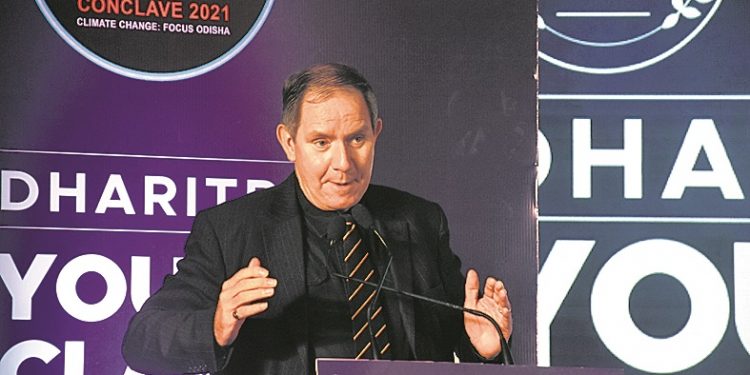He has travelled across six continents of the world because of his work. On completion of his second term as British Deputy High Commissioner, Kolkata, Nick Low, deals with 13 eastern states of India including Odisha. Low, who was in Bhubaneswar to attend the Dharitri Youth Conclave 2021, had a tete-a-tete with Orissa POST correspondent Aviral Mishra. He shares his thoughts on what lies ahead for Odisha in terms of clean energy, electric vehicles and whatnot. Excerpts…
As part of the COP26 zero-emission vehicles campaign, the UK has proposed to support Indian states in transition to electric mobility. Do you think the global and especially the Indian auto industry is ready for such a shift?
I believe that change is gradually happening at a global level. However, what governments all across the world can do is to ensure that there is sufficient infrastructure to encourage people to buy electric cars. The other thing we can do is to legislate to get rid of internal combustion engine vehicles. In the UK, we have already done that and by 2027 we plan to stop the sale of combustion vehicles thereby replacing them with EVs by 2035. I also think, as the demand for EVs increases, the price will eventually fall. It will follow a similar trend as computers, mobile phones and other modern technologies. This is a very much one-way road and we will enter into this transition comfortably by the next decade.
In a state like Odisha, electricity is primarily derived from coal-fired power plants. How would the transitioning to EVs be considered ‘clean’ energy?
I am glad that you asked me that. We had some really good conversations on this with the Odisha government including Development Commissioner Pradeep Kumar Jena. We have discussed EVs, infrastructure and training people in installing and maintaining these infrastructures. Many British organisations are interested to come to Odisha and make that happen. We are also exploring options for clean renewable energy. The UK was once called ‘the dirty man of Europe’ because we burned so much coal to produce electricity. However, now we have planned to remove the use of coal in the next 18 months. We have reduced our greenhouse emissions by 43 per cent since 1990. I do understand that in Odisha, where power generation is mostly from coal, this could be a major challenge but is still doable.
What can Odisha expect from the recently held discussions between the UK and India on Coalition for Disaster Resilient Infrastructure (CDRI), since this coastal state is prone to frequent natural calamities?
The CDRI is an Indian initiative and we are proud to be a part of it. Climate change is sad for us. It’s not coming, it’s already here and it is going to get worse. Even if we stop emitting greenhouse gases today, it’s going to get worse for a few years before it stabilises. So, the need for infrastructure that can withstand extreme weather events is very real and very present. We will listen to the Odisha government very carefully, understand what their needs are and then will work together to meet the needs.
Why do you feel events like Dharitri’s Youth Conclave could motivate youngsters to come forward and work for environmental protection?
I really enjoyed it. And, it’s so energising for people like me to see how involved young people are, especially young women, in issues like climate change. We really need that. We want youngsters to have their voices heard. I want to see a world of blue and green and not yellow and brown. It is really symbolic for me that the first thing that I did in Odisha was to attend this conclave and I am really happy about it. Maybe if there’s another one in 12 months’ time, I would again like to be a part of it.
PNN
